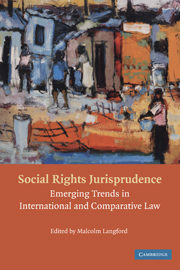Book contents
- Frontmatter
- Contents
- Foreword – Philip Alston
- Preface
- PART ONE OVERVIEW
- PART TWO SELECT NATIONAL JURISDICTIONS
- 4 South Africa
- 5 India
- 6 South Asia
- 7 Colombia
- 8 Argentina
- 9 Brazil
- 10 Venezuela
- 11 Canada
- 12 The United States
- 13 Hungary
- 14 France
- 15 United Kingdom
- 16 Ireland
- PART THREE REGIONAL PROCEDURES AND JURISPRUDENCE
- PART FOUR INTERNATIONAL HUMAN RIGHTS PROCEDURES AND JURISPRUDENCE
- PART FIVE SPECIAL TOPICS
- Notes on Contributors
- Table of Authorities
- Index
- References
11 - Canada
Socio-Economic Rights Under the Canadian Charter
Published online by Cambridge University Press: 05 June 2012
- Frontmatter
- Contents
- Foreword – Philip Alston
- Preface
- PART ONE OVERVIEW
- PART TWO SELECT NATIONAL JURISDICTIONS
- 4 South Africa
- 5 India
- 6 South Asia
- 7 Colombia
- 8 Argentina
- 9 Brazil
- 10 Venezuela
- 11 Canada
- 12 The United States
- 13 Hungary
- 14 France
- 15 United Kingdom
- 16 Ireland
- PART THREE REGIONAL PROCEDURES AND JURISPRUDENCE
- PART FOUR INTERNATIONAL HUMAN RIGHTS PROCEDURES AND JURISPRUDENCE
- PART FIVE SPECIAL TOPICS
- Notes on Contributors
- Table of Authorities
- Index
- References
Summary
INTRODUCTION
Louise Arbour, the former UN High Commissioner of Human Rights and a former Justice of the Supreme Court of Canada, has observed in commenting on the scope of constitutional rights in the Canadian Charter of Rights and Freedoms (‘the Charter’) that ‘the potential to give economic, social and cultural rights the status of constitutional entitlement represents an immense opportunity to affirm our fundamental Canadian values, giving them the force of law’. Meeting this challenge is, however, at best a work in progress. The UN High Commissioner also notes that: ‘The first two decades of Charter litigation testify to a certain timidity – both on the part of litigants and the courts – to tackle head on the claims emerging from the right to be free from want’. As a result, the constitutional status of socio-economic rights in Canada remains, to a large extent, an open question – perhaps the most central unresolved issue in Canadian Charter jurisprudence.
The Charter, marking its twenty-fifth anniversary in 2007, contains no explicit reference to any of the guarantees in the International Covenant on Economic, Social and Cultural Rights (‘ICESCR’). The closest the Charter comes to recognising a socio-economic right is the section 23 right to publicly funded minority language education at the primary and secondary levels, ‘where numbers warrant’. The minority language education guarantee has been interpreted by the Supreme Court as a ‘novel form of legal right’ which ‘confers upon a group a right which places positive obligations on government to alter or develop major institutional structures.
- Type
- Chapter
- Information
- Social Rights JurisprudenceEmerging Trends in International and Comparative Law, pp. 209 - 229Publisher: Cambridge University PressPrint publication year: 2009
References
- 2
- Cited by



